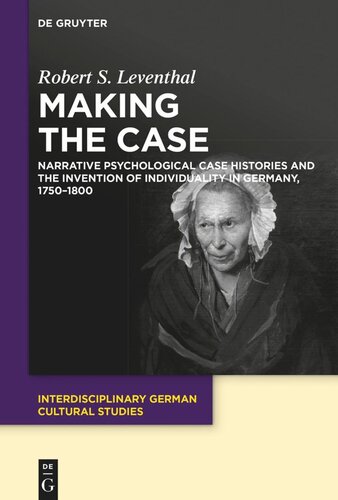

Most ebook files are in PDF format, so you can easily read them using various software such as Foxit Reader or directly on the Google Chrome browser.
Some ebook files are released by publishers in other formats such as .awz, .mobi, .epub, .fb2, etc. You may need to install specific software to read these formats on mobile/PC, such as Calibre.
Please read the tutorial at this link: https://ebookbell.com/faq
We offer FREE conversion to the popular formats you request; however, this may take some time. Therefore, right after payment, please email us, and we will try to provide the service as quickly as possible.
For some exceptional file formats or broken links (if any), please refrain from opening any disputes. Instead, email us first, and we will try to assist within a maximum of 6 hours.
EbookBell Team

0.0
0 reviewsOne hundred years before Freud’s striking psychoanalytic case-histories, the narrative psychological case-history emerged in the second half of the eighteenth century in Germany as an epistemic genre (Gianna Pomata) that cut across the disciplines of medicine, philosophy, law, psychology, anthropology and literature. It differed significantly from its predecessors in theology, jurisprudence, and medicine. Rather than subsuming the individual under an established classification, moral precept, category, or type, the narrative psychological case-history endeavored to articulate the individual in its very individuality, thereby constructing a ‘self’ in its irreducible singularity. The presentation and analysis of several significant psychological case-histories, their theory and practice, as well as the controversies surrounding their utility, validity, and function for an envisioned ‘science of the soul’ constitutes the core of the book. Close and ‘distant’ (F. Moretti) readings of key texts and figures in the discussion regarding ‘empirical psychology’ (psychologia empirica), experiential psychology (Erfahrungsseelenkunde) and ‘medical psychology’ (medizinische Psychologie) such as Christian Wolff, J.C. Krüger, J.C. Bolton, Ernst Nicolai, J.A. Unzer, J.G. Sulzer, J.G. Herder, Friedrich Schiller, Jacob Friedrich Abel, Marcus Herz, Karl Philipp Moritz, J.C. Reil, Ernst Platner and Immanuel Kant provide the disciplinary, historical-scientific context within which this genre comes to the fore. As the first systematic argument concerning the early history of this genre, my thesis is that the psychological case-history evolved as part of a pastoral apparatus of care, concern, guidance and direction for what it fashioned as the ‘unique’ individual, as the discursive medium in a process by which the soul became a ‘self’. The narrative psychological case-history was in fact a meta-genre that transcended traditional boundaries of history and fiction, medicine and philosophy, psychology and anthropology, and sought, for the first time, to explicitly link the experience, history, memory, fantasy, previous trauma or suffering of a unique individual to illness, deviance, aberration and crime. In a word, it demonstrated, as Freud later said of his own case-histories in Studies on Hysteria, “the intimate relation between the history of suffering and the symptoms of illness” (“die innige Beziehung zwischen Leidensgeschichte und Krankheitssymptome”). This genre not only had a profound and far-reaching effect on the evolution of German and European literature – one thinks of the rich traditions of the Novella and the Fallgeschichte from Goethe, Büchner, R. L Stevenson, Edgar Allen Poe and Chekhov to Kafka and beyond – but in shaping modern literature, the clinical sciences, and even popular culture. The book should therefore be of interest not merely to Germanists, modern European cultural historians, historians of science, and literary historians, but also those interested in the history of medicine and psychology, the origins of psychoanalysis, the history of anthropology, cultural studies, and, more generally, the history of ideas.